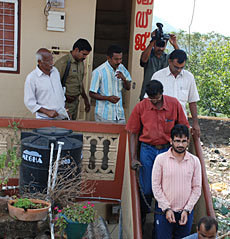THIRUVANANTHAPURAM: Police in Kerala say they have recovered material evidence to prove that the outlawed Students Islamic Movement of India (SIMI) activists learned to make bombs and underwent physical training at a three-day camp held in Vagamon in December 2007.
Similar camps were held in many other places in the country at which they planned a series of attacks to revenge the “demolition of the Babri Masjid, the communal pogrom in Gujarat and the discrimination against Muslims.” Soon blasts rocked many Indian cities, police claim.
Remnants of exploded bombs were recovered Tuesday from a remote corner of Kerala’s popular tourist hill station where Amil Parvesh, 27, the SIMI activist accused in the Bangalore blasts was taken to by the police.
Parvesh, who was the alleged trainer at the camp, was arrested from Indore in Madhya Pradesh last year and brought to Kerala last week. Police collected glass shrapnel and chemicals from the crevice of rock formations shown by Parvesh.
He was also taken to the lodge where he had stayed and the hotel from where he used to eat. Some 40 activists from various parts of India had attended the training camp for manufacturing explosives in the area and eight of them are currently in the police custody including Shibili and Shaduli, the Kerala siblings.
Remains of the materials used in the manufacture of explosives were collected from Thangalpara and nearby areas. Parvesh, a native of Ujjain who is believed to be an expert in bomb making, was the third in command at the camp with a mission to equip the camp participants in subversive activities.
According to the police, Parvesh came to Kochi by train and traveled to Vagamon along with others by car which is in police custody. SIMI’s “2010 plan” surfaced during the interrogation of Safdar Nagori, the SIMI leader who was arrested in Indore last year, was also discussed at the camp.
A series of subversive activities have been credited to SIMI since the 2007 camps at different parts of the country. Police said they planned a serial attack in Gujarat in 2010 when the state turns 50.
They said Amil had trained the campers to put together petrol bombs at the spots he identified on Tuesday. The trainees who also underwent bike riding and swimming practices besides commando training, trekking and rope and rock climbing stayed in three tents pitched at the camp at Thangalpara in Kolahalamedu, home to migrant workers of the nearby plantations. Thangalpara, a rocky terrain accessible only by foot, is also a pilgrim center and an adventure tourist spot that attracts trekkers.
Amil was brought before the First Class Judicial Magistrate Court I, Kanjirappally that remanded him on Feb. 2.
On Monday, he was again brought to the court again and was remanded in police custody for four more days. He will be produced in the court again tomorrow after taking him to Kochi for gathering evidence.


